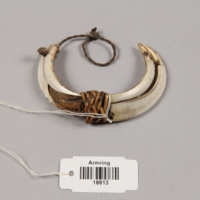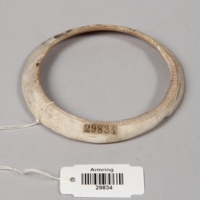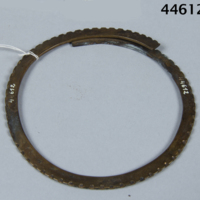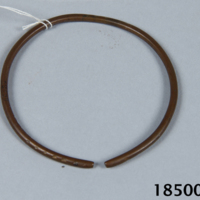Armring
Text
Armring. RJM 18610
Share this
Media
Images
Map Rautenstrauch-Joest Museum
Metadata
Rights
© Photo: Rautenstrauch-Joest Museum – Cultures of the World, Cologne CC BY-NC-ND 4.0
Identifier
RJM-18610
Origin
Bontoc Igorot
Materials
Vegetable fiber, Animal tooth
Process: Braiding
Process: Braiding
Physical Dimensions
107 mm wide, 20 mm high, 97 mm deep
Provenance
"Lot Number 190618. Georg Küppers-Loosen. Georg Küppers-Loosen (1860-1910) was a Cologne entrepreneur and traveller. He was a board member of the Cologne Department of the German Colonial Society, the Cologne Art Museum Society and the Musical Society. In 1887 he took over the flourishing business founded by his father in 1856, providing him with financial means. With his patronage, he supported various Cologne cultural institutions. He was particularly attached to the Rautenstrauch-Joest Museum. Küppers-Loosen was co-founder and for many years vice-chairman of the ""Society of Ethnology for the Promotion of the Rautenstrauch-Joest Museum of the City of Cologne"" and donated an extensive collection of ethnographica and photographs to the museum. Although he was a prominent member of Cologne's society at the end of the 19th / beginning of the 20th century, we do not know much about him and his collecting activities. For now RJM believes that he did actually travel to the Philippines himself from where he also brought some items. There is no further information on his travels, routes or ways of collecting so far. (Added by Sonja Mohr, Curator for collections from Insular Southeast Asia, August 2021)"
Acquisition Date
1906
Display status
Not on display
Official Website
Collection
Source
Translated from German by Google Translate and MPMC editors with the help of RJM curators. Record accessed August 2021.
Cite this Page
“Armring,” Mapping Philippine Material Culture, accessed May 2, 2024, https://philippinestudies.uk/mapping/items/show/7208.
Geolocation
Sensitive Content
Mapping Philippine Material Culture collates digital material from institutions, and some of this material is inherently colonial and contains words, terms and phrases that are inaccurate, derogatory and harmful towards Filipino and Filipino diasporic communities. Catalogue transcriptions, book titles, exhibition titles and museum titles may contain harmful terms. We recognise the potential for the material to cause physical and mental distress as well as evoke strong emotions. Owing to the scale of the collection’s data, a process to implement sensitive-content warnings in the displayed data is still incomplete. The material within the catalogue does not represent Mapping Philippine Material Culture’s views. Mapping Philippine Material Culture maintains a strong anti-colonial, anti-racist position and affirms its support for centring the humanity of historically marginalised and disenfranchised communities.
Facebook Twitter



